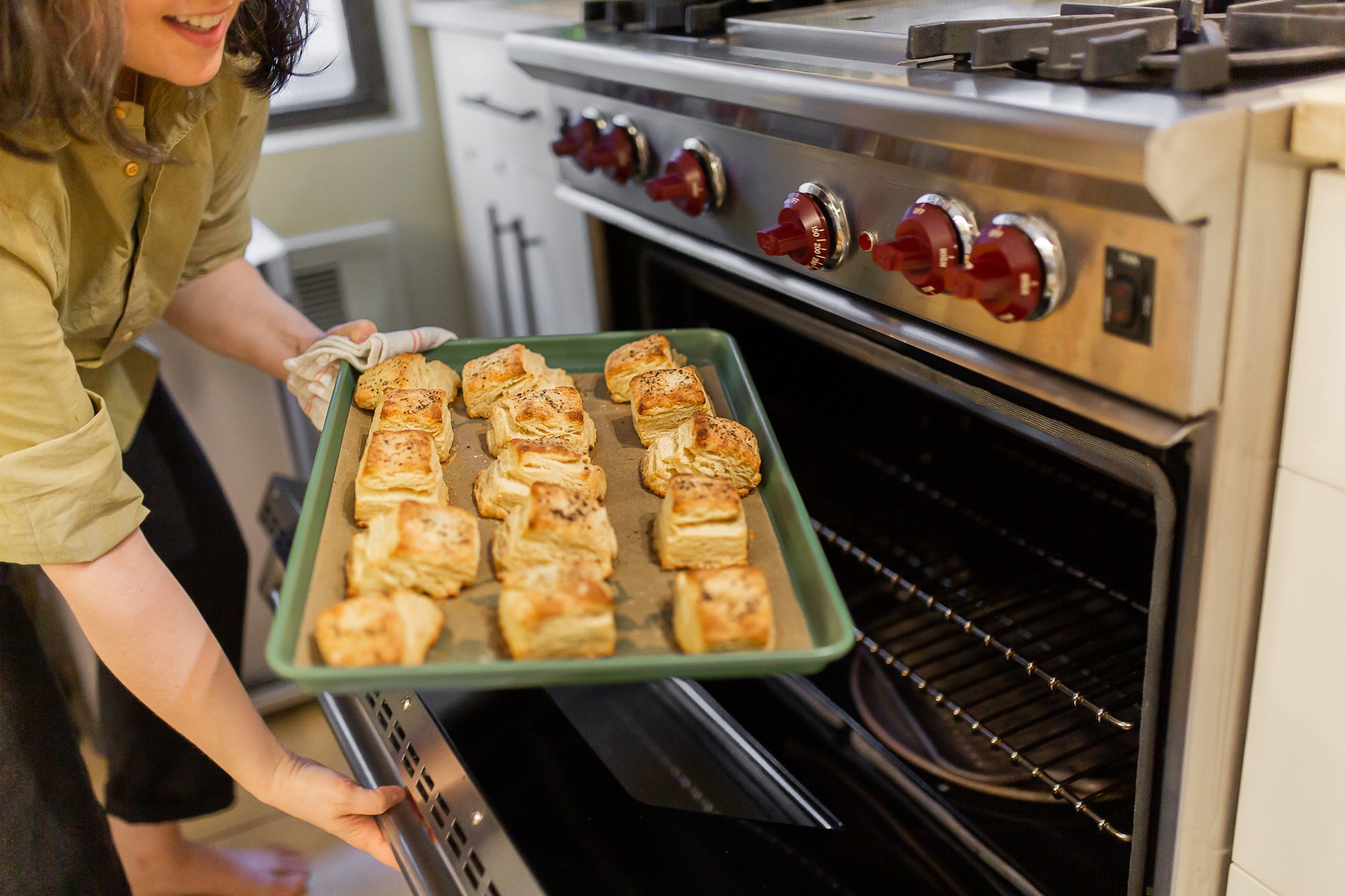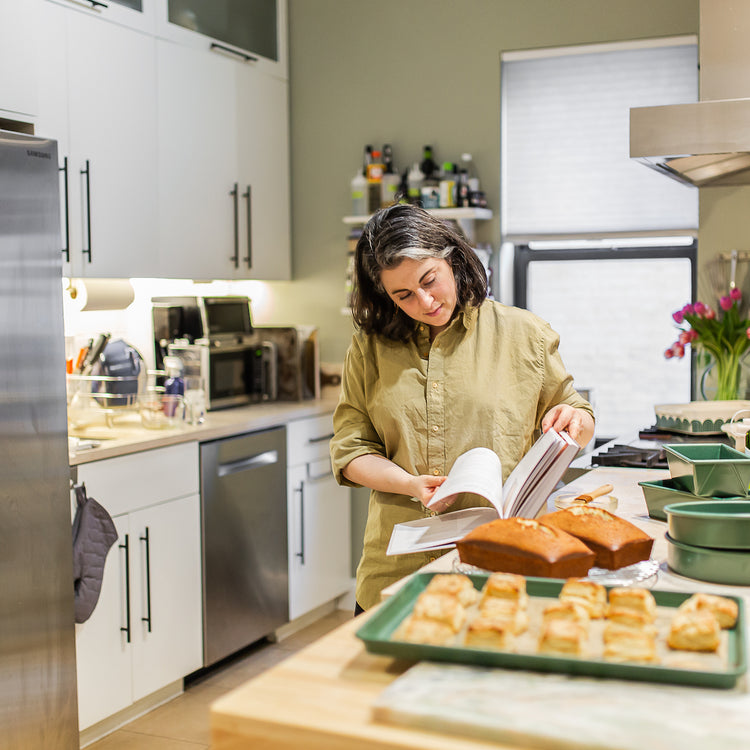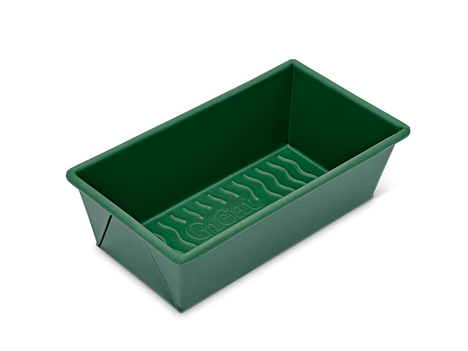Great Ones is a celebration of humans we admire — and an exploration of why they cook, not just how. During her time at Bon Appétit, Claire Saffitz was a kitchen muse known for simple yet satisfying recipes — especially baked goods. Now she’s released her first cookbook, Dessert Person. While she whipped up a few of her new recipes at home in New York City, we spoke with her about what it means to be a dessert person and why baking gets a bad rap.
I realized retroactively that I was a “dessert person.” I just never knew that other people weren't dessert people until I was an adult, and I didn’t understand where they were coming from. So it became a little bit of a battle cry. For me, being a dessert person is about embodying an attitude.
When the server asks, “Did you leave room for dessert?” It's “Yeah, duh.” I named this cookbook Dessert Person because it is a descriptive concept that characterizes my approach to food — that food is one of life's great pleasures, and what a waste to not embrace it as such.
Food is one of life's great pleasures, and what a waste to not embrace it as such.

I come from a family where all of our sociability revolves around food. We love to cook and eat. And like with desserts, I thought that was “normal” until I was a young adult and realized that wasn’t the approach for all families. I really became sensitized to the primacy of food and cooking in my life, and how important that was to my sense of well-being and happiness.
One of my earliest memories is of the smell of garlic browning in olive oil when I was a toddler — my dad was making linguini in clam sauce, which is a family favorite. I just remember thinking to myself, There is no better smell in the world.
Yet I didn't foster serious professional interest in cooking until after college. I realized it was central to my sense of happiness and my primary form of creative expression. After a sustained few years of realizing that cooking and baking were the things I was really into, I thought I should take this as a significant sign and try to pursue it professionally.
I went to culinary school, but that was more of a proximate goal — it was learning for the sake of learning. I didn't know how I was going to pursue cooking and baking as a career. I was in it for the knowledge and to have this experience and to live in France.
In retrospect, my career path makes total sense, but at the time I had no idea what I was doing.

Culinary school included an externship at a restaurant, which is valuable experience. I already knew I didn't want to work in a restaurant, and this certainly confirmed that suspicion. I really did not like working in a restaurant environment — it felt like I was valued for how fast I could create something, and not for my analytical or critical skills.

I thought there was a way to combine my love of cooking with my love of academics and learning, so I went to grad school after culinary school. But I felt cloistered in that university environment. So I pivoted again and found media to be a happy medium because I could do everything I wanted: reading, writing, and cooking. In retrospect, my career path makes total sense, but at the time I had no idea how all of these different experiences were going to coalesce into a career.
Cooking and baking are not that different.At culinary school, I contemplated a pastry program, but I decided to pursue a more general cuisine program because I wanted that breadth of experience, and I think it's really important for people to know how to do both. That’s a central thesis of the book: Cooking and baking are not that different. People see them as super separate, siloed things, but they're not. I think it's really important for a pastry chef to have cuisine experience, and vice versa.
There are many aspects of baking that appealed to my personality — I like that it's technical, I like that there's a specific order of operations. I enjoy the precision of it, but it also feels super sensorial and sensual. It checks all the boxes of things that I love.
I very much see myself as a home baker.

I don’t consider myself a pastry professional. I've never worked in a bakery, I've never run a pastry kitchen, and I've never done high-volume production. I very much see myself as a home baker, and that’s the perspective from which I wrote Dessert Person. I developed these recipes at home and not in a test kitchen, which was a huge advantage. I felt closer to the recipes, and I felt like I could better identify with people who would be making them at home, which I think improved the quality of the recipes.
I think cooking experience makes you a better baker, and baking experience makes you a better cook.Dessert Person is my attempt to get people who like being in the kitchen to become less intimidated by baking, which often gets a bad rap. When people say, “I cook, but I don't bake,” I hear a bias against baking. There's a romance to cooking because you're on high heat, and you have a pan, and there's an improvisational aspect to it. And with baking people visualize someone in a white, sterile kitchen sitting over a scale or something.

Of course, there are fundamental differences between cooking and baking, but they exist on a spectrum. Generally speaking, cooking demands less precision, and baking requires more of an emphasis on precise measurement. But it's a permeable membrane; there's so much osmosis from one to the other, and I think people lose sight of that. Think about a chicken potpie — is that cooking or baking? You're making pastry, but you're cooking a filling. There's so much fusion of the two.
Baking is so much more than brownies and chocolate-chip cookies.I don't want people to feel like they can only identify as one or the other. I think cooking experience makes you a better baker, and baking experience makes you a better cook. Balance, acid, fat — it’s the same exercise in the same part of your brain that you have to apply to both.

Like cooking, baking can be a way to experience and express seasonality: You go to the farmers’ market and see quince in the fall and the first strawberries in the spring. I experience the passing of time through baking with different kinds of produce.
I experience the passing of time through baking.

My recipes often start with an idea of a flavor combination or a type of dish or even a feeling that I want to have. Often, the idea is taking an existing thing and trying to see if I can improve upon it. Sometimes I don’t like a recipe, so I try to make a version of it that I can get behind. I’ll take an idea and then flesh it out to see if it will work.
Many years ago, I had an idea to combine pears and chestnutsFor example, many years ago, I had an idea to combine pears and chestnuts. They come into season at the same time, but I hadn't really seen them together. I struggled to figure out the best way to combine them — at first, it was a tart with poached pears and a chestnut filling, and it just felt too fussy. I didn’t even really want to make it.
Then I decided to try it as a cake, and it eventually became a pear chestnut cake, which I love. I tested it two or three times, and it became simpler and better with time. That’s always a really good thing.
Chestnuts are a quintessential fall ingredient. In the past, I’ve bought fresh chestnuts and roasted and peeled them, but it’s a huge pain. I’ll never do it again. If I want the benefit of chestnuts without the work, I get already-cooked chestnuts in a sealed bag or a jar. I love how earthy they are — their texture is soft but starchy.
It's just an any-time-of-the-day cake.

One day, I had this lightbulb moment that you can mix them with sugar, which will break down the chestnuts into an earthy, thick paste, and then you can cream it with butter. Then you have a basic cake method — you cream, then you add the eggs, and then the dry ingredients. There’s crème fraîche in the recipe, which gives such tenderness and tang and richness. There's chopped-up pear inside the cake and sliced pear on top, and then I top it with granulated sugar for a crunch.
That cake is representative of a lot of recipes in the book that are fruit-forward — it’s not overly sweet, so you could have it for dessert, and then you can have it for breakfast or a snack. It's just an any-time-of-the-day cake.

Desserts are meant to be shared — there are very few desserts for one!
One thing I love about desserts is that they're meant to be shared. There are very few desserts for one. There's something inherently social and generous about baking. I love bringing a pie or cake to friends or family. People are excited, and there's a little domestic drama to that moment when dessert comes out and we get to eat it. In general, I enjoy the baking and the eating equally; I tried to make everything in the book be things I would equally want to make and eat.

When I’m recipe testing, there’s a certain amount of sensitivity and uncertainty about the process. But once I have the recipe and I know how it’s going to turn out, baking gets me in my flow state: I'm listening to music, and my hands are touching pie dough or rolling something out. That's where I experience pure pleasure and contentment, and I am very grateful that I still get that feeling.
Photos by Anna Meyer
























